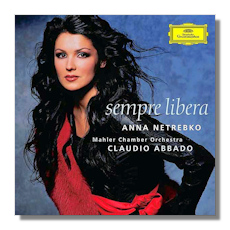
The Internet's Premier Classical Music Source
Related Links
-
Bellini Reviews
Donizetti Reviews
Puccini Reviews
Verdi Reviews - Latest Reviews
- More Reviews
-
By Composer
-
Collections
DVD & Blu-ray
Books
Concert Reviews
Articles/Interviews
Software
Audio
Search Amazon
Recommended Links
Site News
 CD Review
CD Review
Anna Netrebko

Sempre Libera
- Scenes and arias from:
- Vincenzo Bellini:
- La Sonnambula
- I Puritani
- Gaetano Donizetti: Lucia di Lammermoor
- Giuseppe Verdi:
- Otello
- La traviata
- Giacomo Puccini: Gianni Schicchi
Anna Netrebko, soprano
Coro Sinfonico di Milano Giuseppe Verdi
Mahler Chamber Orchestra/Claudio Abbado
Deutsche Grammophon 474800-2 DDD 69:00
Also released on Hybrid Multichannel SACD 474881-2: Amazon - UK - Germany - Canada - France - Japan
Deutsche Grammophon has given this new Russian soprano the star treatment. The conductor is one of the finest opera maestros from the past quarter century, all of the selections are performed with supporting singers and chorus as needed, and the booklet contains full texts and translations. (It also contains a number of photographs of the svelte and dark-eyed soprano, who looks alternately girlish and sexy.) The Mad Scene from Lucia is not performed with the usual flute obbligato, but with a glass harmonica (here played by Sascha Reckert) – something I've not heard since Beverly Sills's complete recording from the 1970s! This is Netrebko's second recording for DG; the first collection of Opera Arias (474240-2 Amazon - UK - Germany - Canada - France - Japan - ArkivMusic or Multichannel SACD 474640-2 Amazon - UK - Germany - Canada - France - Japan ) was released not long after her by all accounts smashing 2002 debut in Salzburg as Don Giovanni's Donna Anna.
This was my first exposure to Netrebko, however. At first, I was not overly impressed. The Act One scena from La traviata is what opens this CD, and it doesn't show the soprano in the best light. "Ah, fors'è lui" is pretty but a little bland, and the succeeding "Sempre libera," while vivacious (and not without an appropriate touch of panic), reveals Netrebko's tendency to swallow the final syllables of words, as if she were running out of breath. "Feh," I thought, and put this CD to one side, only to pick it up a little more than a month later.
Continuing on, I was much more favorably disposed to this recital than my first impression would have suggested. The bel canto heroines – Amina, Elvira, and Lucia – are better than her Violetta. Here is a soprano with a brilliant sound, yet with enough body to facilitate expression, and a darkness well suited to tragic situations. In the booklet note, Netrebko cites Callas, Freni, and Scotto as her heroines, and there's a bit of all three of that stellar trio in these performances. (Freni, who sang much of this repertoire fairly early in her career, is the one Netrebko most resembles, I would say.) She has yet to sing Verdi's Desdemona on stage, and her lack of experience is shown by a Willow Song and an "Ave Maria" that are, as of yet, a little underbaked. Some moments come right to life (the anxious monotone at the very start of the "Ave Maria," for example), others are works in progress. The high notes are clean and exciting, with the exception of the one at the end of Lucia's Mad Scene. There is much promise here, but it is premature to hail Netrebko as the next Gheorghiu… or the next Freni, for that matter. I am sure we all wish her the best.
Abbado and his colleagues have created a luxurious setting for Netrebko's nascent jewel. (Sara Mingardo is Emilia in the Otello selection!) I found the more than half-minute gap between the "Ave Maria" and "O mio babbino caro" (languorously conducted by Abbado) to be odd, though. Now let's have a recording of Netrebko in a complete role. A new Don Giovanni, anyone?
Copyright © 2005, Raymond Tuttle



















